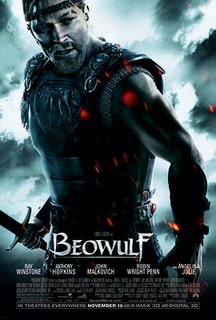
Much like
300,
Beowulf is an attempt to bring an ancient story into the present with modern day computer wizardry. Whereas
300 put live actors in a digital world,
Beowulf decides to go completely digital, replacing the actors with CG recreations that often resemble the actual people. The end result is a visual triumph to be sure. While it at times resembles a high end video game, this movie is stunning to watch. You're certain to remember many moments, such as when the title hero hangs on for dear life on the back of a rampaging dragon, or when he is engaged in a life or death struggle with some ferocious sea monsters. What you'll most likely remember less is the storytelling and screenplay, which is somewhat talky and dry. Although the visuals and the accompanying script don't always mix together, the end result is a mostly satisfying experience while you're watching it that quickly fades almost as soon as the end credits start to roll.
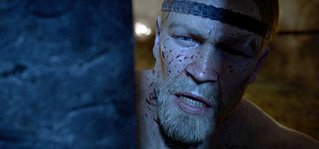
The story of
Beowulf is set in the ancient kingdom of Heorot, which is living in fear of a monster who lives in a cave nearby named Grendel (Crispin Glover). The ruler of Heorot, King Hrothgar (Anthony Hopkins) sends out a request for any soldier brave enough to rid his land of the cursed creature. The request reaches the ear of a traveling warrior named Beowulf (Ray Winstone), whose exploits of bravery are already famous. Beowulf arrives at the kingdom with his followers, prepared to slay the beast. His arrival and boasts of certain victory are met mostly with skepticism, particularly from the King's advisor Unferth (John Malkovich) and the lovely young woman named Wealthow (Robin Wright-Penn), who nonetheless is drawn him. Beowulf does manage to succeed in his battle with Grendel, but his victory is short-lived when the mother of the demon he slayed (Angelina Jolie), a seductive and vile temptress creature, arrives seeking vengeance. When Beowulf goes to confront this new monster, he ends up making a decision that will not only control the remainder of his life, but also the very kingdom that he eventually rules and swears to protect.
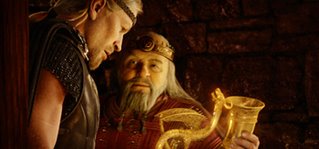
As the first computer animated film targeted at older viewers to get a theatrical release since 2001's
Final Fantasy: The Spirits Within,
Beowulf deserves at least some credit for attempting something different and very adult. Despite a PG-13 rating, the film is often quite graphic in its depiction of violence and nudity that would most certainly have earned it an R if the characters were flesh and blood. The way the film dodges around the nudity issue (no nipples on bare breasts, objects placed cleverly in the foreground to cover up any private areas
Austin Powers-style) is somewhat comical, but it doesn't take us out of the experience as much as it probably should. Director Robert Zemeckis continues to experiment with Motion Capture Animation, a technique he first used with 2004's
The Polar Express. What this basically means is that rather than having the characters be animated in a traditional sense, the actors perform the actions of the characters on an empty set. The actors are covered with sensors that read their body and muscle movements, and feeds them into a computer. Since we are mostly watching the movements of live actors, it allows more fluid and lifelike animation and facial expressions. Compare the characters and overall look of
Beowulf to his earlier effort, and you'll see that the technique has come a long way in a short time.
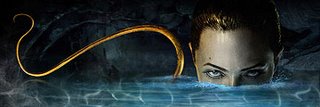
The animated characters have been designed for the most part to resemble the actors who play them, and the end result is almost uncanny in an eerie, but definitely cool, way. Close ups of the characters faces reveals a great attention to detail, right down to the facial imperfections and the movements of individual parts of the body when they move or speak. We're never quite under the illusion of the characters being real, and we never forget that we're watching a computer animated film, but this is still probably the closest anyone has come to creating a near-photo realistic interpretation of a human figure in an animated film. Where Zemeckis and his team of animators still need to work is in the eyes of the characters, which have a very strange glassy and artificial look to them. It may sound like a minor detail, but it really becomes an issue during some of the film's more dramatic or emotional moments. When the characters are having a dramatic conversation, but their eyes are nearly lifeless as they look at each other, it really takes you out of the illusion of the film. Despite this, everything else about the film's look and design is spot on. The snow-topped surroundings outside the castle walls have a deceptively real appearance, and sometimes l mistook them for physical backdrops instead of settings generated from a computer.
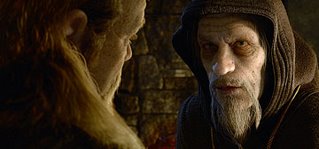
If there is any one reason to see
Beowulf, especially on the big screen, it is the film's many impressive action sequences that definitely stand above most other films I can think of this year. The film uses the freedom of animation to the fullest, creating some truly memorable battles, particularly the grand climax. With two different versions currently playing in theaters, one on regular screens and the other in 3D on IMAX screens, it's pretty much needless to say that it needs to be seen in IMAX for the full effect. Regardless, however you see the film, it's almost certain to impress. The combination of the actors' original performances, which served as the basis for the character animation, with the computer generated settings and creatures that inhabit the world created by the artists is nearly seamless and creates a visual experience that truly captivates. It's a good thing too, as the screenplay and storytelling never seem to quite reach the heights of the visuals. The screenplay by Neil Gaiman (
Mirrormask) and Roger Avary (
Silent Hill) has a hard time picking up the slack when the action isn't grabbing our attention. It sometimes seems to delve into the realm of total silliness, such as how many of the characters bellow their lines at the top of their lungs like professional wrestlers. The story has been fleshed out from the original source material, but the characters never truly seem human or developed, and this is the film's main flaw.
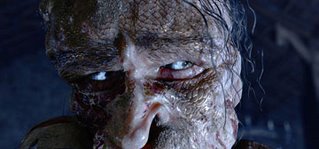
For all of the technical wizardry and marvel that is on display,
Beowulf is disappointingly thin when it comes to characters and emotion. There are plenty of opportunities for the movie to grab our emotions, but the movie fails to exploit on almost all of them until the third act of the film. Relationships are hinted at and mainly kept at a distance, and when they do take center stage, they seem cold and artificial. Wealthow's reaction (or lack thereof) to Beowulf's not so secret affair with another woman is left mainly in the dark, and we never get a true sense as to why she is so forgiving toward him and the other woman. Likewise, their relationship in the first place is almost completely skipped over, as the movie simply flashes forward to them having been together for most of their lives, without any real information as to why they've been together so long or what the attraction was in the first place, other than physical. The characters seldom have time to think or feel anything that has nothing to do with the plot at hand. To their credit, the actors do what they can with the roles they've been given, with the main highlights being Anthony Hopkins, Crispin Glover, and Brendan Gleeson as Beowulf's loyal friend and soldier. These actors rise to the occasion, while a few others such as John Malkovich and Robin Wright-Penn, somewhat disappear into their paper thin roles.
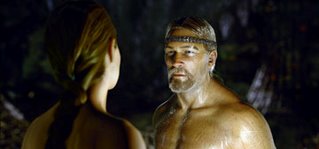
I'm recommending
Beowulf mainly as an experience. As a film, it has stunning visuals with a plot that could have and should have been much more developed, especially considering the screenplay has been in the works for roughly 10 years. This is the kind of movie that will most likely lose something on DVD. I can picture the film's narrative and character flaws being much harder to ignore when the wonderful images aren't surrounding you on the big screen. As an attempt to break free of the "family" mentality that has long been associated with computer animated films,
Beowulf is a good if not flawed attempt. The technology and the skill is definitely there. Now all we need are screenwriters who are willing to keep up with it.
0 comments
 Much like 300, Beowulf is an attempt to bring an ancient story into the present with modern day computer wizardry. Whereas 300 put live actors in a digital world, Beowulf decides to go completely digital, replacing the actors with CG recreations that often resemble the actual people. The end result is a visual triumph to be sure. While it at times resembles a high end video game, this movie is stunning to watch. You're certain to remember many moments, such as when the title hero hangs on for dear life on the back of a rampaging dragon, or when he is engaged in a life or death struggle with some ferocious sea monsters. What you'll most likely remember less is the storytelling and screenplay, which is somewhat talky and dry. Although the visuals and the accompanying script don't always mix together, the end result is a mostly satisfying experience while you're watching it that quickly fades almost as soon as the end credits start to roll.
Much like 300, Beowulf is an attempt to bring an ancient story into the present with modern day computer wizardry. Whereas 300 put live actors in a digital world, Beowulf decides to go completely digital, replacing the actors with CG recreations that often resemble the actual people. The end result is a visual triumph to be sure. While it at times resembles a high end video game, this movie is stunning to watch. You're certain to remember many moments, such as when the title hero hangs on for dear life on the back of a rampaging dragon, or when he is engaged in a life or death struggle with some ferocious sea monsters. What you'll most likely remember less is the storytelling and screenplay, which is somewhat talky and dry. Although the visuals and the accompanying script don't always mix together, the end result is a mostly satisfying experience while you're watching it that quickly fades almost as soon as the end credits start to roll. The story of Beowulf is set in the ancient kingdom of Heorot, which is living in fear of a monster who lives in a cave nearby named Grendel (Crispin Glover). The ruler of Heorot, King Hrothgar (Anthony Hopkins) sends out a request for any soldier brave enough to rid his land of the cursed creature. The request reaches the ear of a traveling warrior named Beowulf (Ray Winstone), whose exploits of bravery are already famous. Beowulf arrives at the kingdom with his followers, prepared to slay the beast. His arrival and boasts of certain victory are met mostly with skepticism, particularly from the King's advisor Unferth (John Malkovich) and the lovely young woman named Wealthow (Robin Wright-Penn), who nonetheless is drawn him. Beowulf does manage to succeed in his battle with Grendel, but his victory is short-lived when the mother of the demon he slayed (Angelina Jolie), a seductive and vile temptress creature, arrives seeking vengeance. When Beowulf goes to confront this new monster, he ends up making a decision that will not only control the remainder of his life, but also the very kingdom that he eventually rules and swears to protect.
The story of Beowulf is set in the ancient kingdom of Heorot, which is living in fear of a monster who lives in a cave nearby named Grendel (Crispin Glover). The ruler of Heorot, King Hrothgar (Anthony Hopkins) sends out a request for any soldier brave enough to rid his land of the cursed creature. The request reaches the ear of a traveling warrior named Beowulf (Ray Winstone), whose exploits of bravery are already famous. Beowulf arrives at the kingdom with his followers, prepared to slay the beast. His arrival and boasts of certain victory are met mostly with skepticism, particularly from the King's advisor Unferth (John Malkovich) and the lovely young woman named Wealthow (Robin Wright-Penn), who nonetheless is drawn him. Beowulf does manage to succeed in his battle with Grendel, but his victory is short-lived when the mother of the demon he slayed (Angelina Jolie), a seductive and vile temptress creature, arrives seeking vengeance. When Beowulf goes to confront this new monster, he ends up making a decision that will not only control the remainder of his life, but also the very kingdom that he eventually rules and swears to protect. As the first computer animated film targeted at older viewers to get a theatrical release since 2001's Final Fantasy: The Spirits Within, Beowulf deserves at least some credit for attempting something different and very adult. Despite a PG-13 rating, the film is often quite graphic in its depiction of violence and nudity that would most certainly have earned it an R if the characters were flesh and blood. The way the film dodges around the nudity issue (no nipples on bare breasts, objects placed cleverly in the foreground to cover up any private areas Austin Powers-style) is somewhat comical, but it doesn't take us out of the experience as much as it probably should. Director Robert Zemeckis continues to experiment with Motion Capture Animation, a technique he first used with 2004's The Polar Express. What this basically means is that rather than having the characters be animated in a traditional sense, the actors perform the actions of the characters on an empty set. The actors are covered with sensors that read their body and muscle movements, and feeds them into a computer. Since we are mostly watching the movements of live actors, it allows more fluid and lifelike animation and facial expressions. Compare the characters and overall look of Beowulf to his earlier effort, and you'll see that the technique has come a long way in a short time.
As the first computer animated film targeted at older viewers to get a theatrical release since 2001's Final Fantasy: The Spirits Within, Beowulf deserves at least some credit for attempting something different and very adult. Despite a PG-13 rating, the film is often quite graphic in its depiction of violence and nudity that would most certainly have earned it an R if the characters were flesh and blood. The way the film dodges around the nudity issue (no nipples on bare breasts, objects placed cleverly in the foreground to cover up any private areas Austin Powers-style) is somewhat comical, but it doesn't take us out of the experience as much as it probably should. Director Robert Zemeckis continues to experiment with Motion Capture Animation, a technique he first used with 2004's The Polar Express. What this basically means is that rather than having the characters be animated in a traditional sense, the actors perform the actions of the characters on an empty set. The actors are covered with sensors that read their body and muscle movements, and feeds them into a computer. Since we are mostly watching the movements of live actors, it allows more fluid and lifelike animation and facial expressions. Compare the characters and overall look of Beowulf to his earlier effort, and you'll see that the technique has come a long way in a short time. The animated characters have been designed for the most part to resemble the actors who play them, and the end result is almost uncanny in an eerie, but definitely cool, way. Close ups of the characters faces reveals a great attention to detail, right down to the facial imperfections and the movements of individual parts of the body when they move or speak. We're never quite under the illusion of the characters being real, and we never forget that we're watching a computer animated film, but this is still probably the closest anyone has come to creating a near-photo realistic interpretation of a human figure in an animated film. Where Zemeckis and his team of animators still need to work is in the eyes of the characters, which have a very strange glassy and artificial look to them. It may sound like a minor detail, but it really becomes an issue during some of the film's more dramatic or emotional moments. When the characters are having a dramatic conversation, but their eyes are nearly lifeless as they look at each other, it really takes you out of the illusion of the film. Despite this, everything else about the film's look and design is spot on. The snow-topped surroundings outside the castle walls have a deceptively real appearance, and sometimes l mistook them for physical backdrops instead of settings generated from a computer.
The animated characters have been designed for the most part to resemble the actors who play them, and the end result is almost uncanny in an eerie, but definitely cool, way. Close ups of the characters faces reveals a great attention to detail, right down to the facial imperfections and the movements of individual parts of the body when they move or speak. We're never quite under the illusion of the characters being real, and we never forget that we're watching a computer animated film, but this is still probably the closest anyone has come to creating a near-photo realistic interpretation of a human figure in an animated film. Where Zemeckis and his team of animators still need to work is in the eyes of the characters, which have a very strange glassy and artificial look to them. It may sound like a minor detail, but it really becomes an issue during some of the film's more dramatic or emotional moments. When the characters are having a dramatic conversation, but their eyes are nearly lifeless as they look at each other, it really takes you out of the illusion of the film. Despite this, everything else about the film's look and design is spot on. The snow-topped surroundings outside the castle walls have a deceptively real appearance, and sometimes l mistook them for physical backdrops instead of settings generated from a computer. If there is any one reason to see Beowulf, especially on the big screen, it is the film's many impressive action sequences that definitely stand above most other films I can think of this year. The film uses the freedom of animation to the fullest, creating some truly memorable battles, particularly the grand climax. With two different versions currently playing in theaters, one on regular screens and the other in 3D on IMAX screens, it's pretty much needless to say that it needs to be seen in IMAX for the full effect. Regardless, however you see the film, it's almost certain to impress. The combination of the actors' original performances, which served as the basis for the character animation, with the computer generated settings and creatures that inhabit the world created by the artists is nearly seamless and creates a visual experience that truly captivates. It's a good thing too, as the screenplay and storytelling never seem to quite reach the heights of the visuals. The screenplay by Neil Gaiman (Mirrormask) and Roger Avary (Silent Hill) has a hard time picking up the slack when the action isn't grabbing our attention. It sometimes seems to delve into the realm of total silliness, such as how many of the characters bellow their lines at the top of their lungs like professional wrestlers. The story has been fleshed out from the original source material, but the characters never truly seem human or developed, and this is the film's main flaw.
If there is any one reason to see Beowulf, especially on the big screen, it is the film's many impressive action sequences that definitely stand above most other films I can think of this year. The film uses the freedom of animation to the fullest, creating some truly memorable battles, particularly the grand climax. With two different versions currently playing in theaters, one on regular screens and the other in 3D on IMAX screens, it's pretty much needless to say that it needs to be seen in IMAX for the full effect. Regardless, however you see the film, it's almost certain to impress. The combination of the actors' original performances, which served as the basis for the character animation, with the computer generated settings and creatures that inhabit the world created by the artists is nearly seamless and creates a visual experience that truly captivates. It's a good thing too, as the screenplay and storytelling never seem to quite reach the heights of the visuals. The screenplay by Neil Gaiman (Mirrormask) and Roger Avary (Silent Hill) has a hard time picking up the slack when the action isn't grabbing our attention. It sometimes seems to delve into the realm of total silliness, such as how many of the characters bellow their lines at the top of their lungs like professional wrestlers. The story has been fleshed out from the original source material, but the characters never truly seem human or developed, and this is the film's main flaw. For all of the technical wizardry and marvel that is on display, Beowulf is disappointingly thin when it comes to characters and emotion. There are plenty of opportunities for the movie to grab our emotions, but the movie fails to exploit on almost all of them until the third act of the film. Relationships are hinted at and mainly kept at a distance, and when they do take center stage, they seem cold and artificial. Wealthow's reaction (or lack thereof) to Beowulf's not so secret affair with another woman is left mainly in the dark, and we never get a true sense as to why she is so forgiving toward him and the other woman. Likewise, their relationship in the first place is almost completely skipped over, as the movie simply flashes forward to them having been together for most of their lives, without any real information as to why they've been together so long or what the attraction was in the first place, other than physical. The characters seldom have time to think or feel anything that has nothing to do with the plot at hand. To their credit, the actors do what they can with the roles they've been given, with the main highlights being Anthony Hopkins, Crispin Glover, and Brendan Gleeson as Beowulf's loyal friend and soldier. These actors rise to the occasion, while a few others such as John Malkovich and Robin Wright-Penn, somewhat disappear into their paper thin roles.
For all of the technical wizardry and marvel that is on display, Beowulf is disappointingly thin when it comes to characters and emotion. There are plenty of opportunities for the movie to grab our emotions, but the movie fails to exploit on almost all of them until the third act of the film. Relationships are hinted at and mainly kept at a distance, and when they do take center stage, they seem cold and artificial. Wealthow's reaction (or lack thereof) to Beowulf's not so secret affair with another woman is left mainly in the dark, and we never get a true sense as to why she is so forgiving toward him and the other woman. Likewise, their relationship in the first place is almost completely skipped over, as the movie simply flashes forward to them having been together for most of their lives, without any real information as to why they've been together so long or what the attraction was in the first place, other than physical. The characters seldom have time to think or feel anything that has nothing to do with the plot at hand. To their credit, the actors do what they can with the roles they've been given, with the main highlights being Anthony Hopkins, Crispin Glover, and Brendan Gleeson as Beowulf's loyal friend and soldier. These actors rise to the occasion, while a few others such as John Malkovich and Robin Wright-Penn, somewhat disappear into their paper thin roles. I'm recommending Beowulf mainly as an experience. As a film, it has stunning visuals with a plot that could have and should have been much more developed, especially considering the screenplay has been in the works for roughly 10 years. This is the kind of movie that will most likely lose something on DVD. I can picture the film's narrative and character flaws being much harder to ignore when the wonderful images aren't surrounding you on the big screen. As an attempt to break free of the "family" mentality that has long been associated with computer animated films, Beowulf is a good if not flawed attempt. The technology and the skill is definitely there. Now all we need are screenwriters who are willing to keep up with it.
I'm recommending Beowulf mainly as an experience. As a film, it has stunning visuals with a plot that could have and should have been much more developed, especially considering the screenplay has been in the works for roughly 10 years. This is the kind of movie that will most likely lose something on DVD. I can picture the film's narrative and character flaws being much harder to ignore when the wonderful images aren't surrounding you on the big screen. As an attempt to break free of the "family" mentality that has long been associated with computer animated films, Beowulf is a good if not flawed attempt. The technology and the skill is definitely there. Now all we need are screenwriters who are willing to keep up with it.






0 Comments:
Post a Comment
<< Home